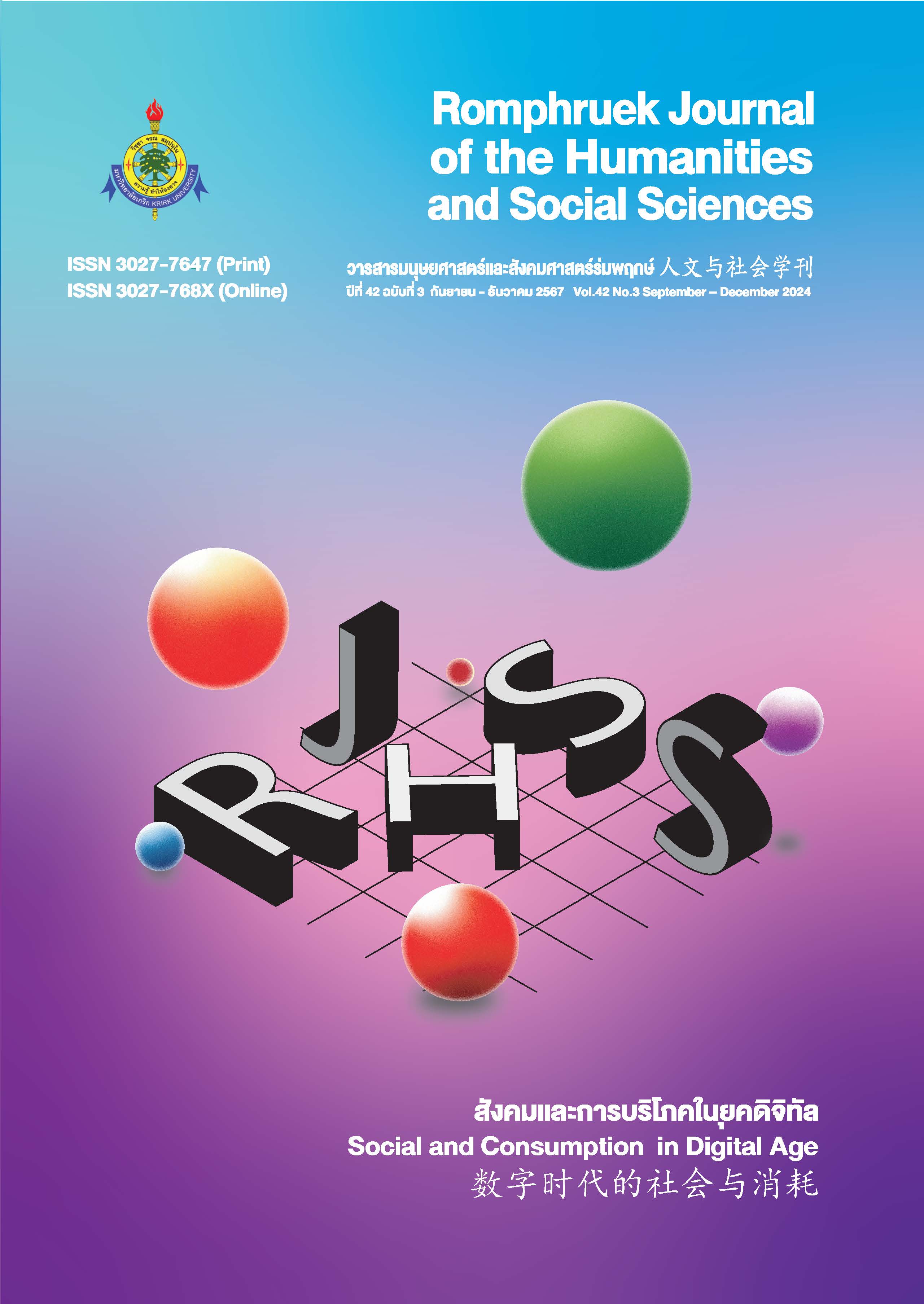Resilience and Technology Adoption: A Narrative Study to Understand How Generation X Instructors Overcome Challenges in the Digital Era for Constructing Grounded Theory
Main Article Content
Abstract
This research aimed to 1) study the stories of Generation X instructors overcoming challenges in the digital era society, and 2) develop a grounded theory on the resilience and technology adoption of Generation X instructors. It employed a qualitative approach using narrative methodology and grounded theory. The key informant was one Generation X instructor, along with two colleagues and four students from their class, selected through purposive sampling. Data was collected through in-depth interviews, observation, note-taking, and reviewing relevant documents. The findings revealed that 1) the key challenge for the Generation X instructor was the fear arising from a lack of technological proficiency and the complexity of technology use, which was overcome by having an open mind, continual learning, developing personal techniques though creating self-technology, hands-on practice, receiving social support from colleagues and the organization, as well as self-confidence in one's own potential. 2) Developing resilience and technology acceptance for the Generation X instructor consisted of three core components: Self, Support, and Structure, along with one enhancing component - Creating an Environment.
Article Details

This work is licensed under a Creative Commons Attribution-NonCommercial-NoDerivatives 4.0 International License.
Every article published in the Romphruek Journal of the Humanities and Social Sciences is the opinion and point of view of the authors. Thery're not the viewpoint of Krirk University or the editored department. Any part or all of the articles for pablication must be clearly cited.
References
Abdol Ghapar, M., Shamsudin, A., Ngah, N. E., Adenan, N. D., & Sharkawi, S. (2023). GEN X LECTURERS: WHAT HINDERS THEM FROM TECHNOLOGY? International Journal of Education and Pedagogy, 5(1), 145-156.
Bandura, A. (2011). On the Functional Properties of Perceived Self-Efficacy Revisited. Journal of Management, 38(1), 9-44.
Barnes, J., Lemana II, H. E., Rulona, J., Bretaña, M., Mortalla, R., & Abordo, C. (2023). Navigating the Digital Age: Insights from Gen X Educators in the Philippines. Psychology and Education: A Multidisciplinary Journal, 14(6), 1-11.
Charmaz, K. (2014). Constructing Grounded Theory: A Practical Guide through Qualitative Analysis. (2 ed.). SAGE.
Culp-Roche, A., Hampton, D., Hensley, A., Wilson, J., Thaxton-Wiggins, A., Otts, J. A., Fruh, S., & Moser, D. K. (2020). Generational Differences in Faculty and Student Comfort With Technology Use. SAGE Open Nurs, 6(2020), 2377960820941394.
Davis, F. D. (1989). Perceived Usefulness, Perceived Ease of Use, and User Acceptance of Information Technology. MIS Quarterly, 13(3), 319-340.
Granic, A. (2022). Educational Technology Adoption: A systematic review. Educ Inf Technol (Dordr), 27(7), 9725-9744.
Kumar, S., Goel, U., Joshi, P., & Johri, A. (2024). Factors affecting Information & Communication Technology (ICT) adoption among MSMEs. Journal of Open Innovation: Technology, Market, and Complexity, 10(1), 100205.
Lee, K.-W., & Tseng, Y.-F. (2024). Driving the dual learning process of management knowledge: A social cognitive theory perspective. The International Journal of Management Education, 22(1), 100940.
Mensah, C., Azila-Gbettor, E. M., Nunyonameh, C. R., Appietu, M. E., & Amedome, S. N. (2023). Research methods anxiety, attitude, self-efficacy and academic effort: A social cognitive theory perspective. Cogent Psychology, 10(1), 2167503.
Office of the Permanent Secretary, M. (2023). Higher Education Plan for Manpower Planning and Development 2023-2027. Parbpim.
Panawong, C. (2019). Qualitative Research Methodology. Phitsanulok: Naresuan University Publishing House.
Pasunon, P., & Siriwong, P. (2013). Efficiency and key success of agricultural cooperative operation: A study for grounded theory. Veridian E-Journal, 6(1), 610-628.
Poohongthong, C. (2018). Transformative Learning: Challenges for instructors in Higher Education. The Periodical of Behavioral Science, 24(1), 163-182.
Reyes, A., Galvan, R., Jr., Navarro, A., Velasquez, M., Soriano, D. R., Cabuso, A. L., David, J. R., Lacson, M. L., Manansala, N. T., & Tiongco, R. E. (2020). Across Generations: Defining Pedagogical Characteristics of Generation X, Y, and Z Allied Health Teachers Using Q-Methodology. Med Sci Educ, 30(4), 1541-1549.
Sinchai, K., & Jeyalee, O. (2020). Online learning and teaching management under social change in the 21st century. Phuket Rajabhat University Academic Journal, 16(2), 1-18.
Sungrugsa, N. (2018). Narrative Approach : The New Methodology to Knowledge Inquiry for Social Research. Silpakorn Education Research Journal, 10(2), 1-18.
Syakieb Arsalan, & Latif., D. V. (2021). Technology Adoption Of Millennial Generations In Implementation Of Self Ordering Machine In Fast Food Restaurant. Turkish Journal of Computer and Mathematics Education, 12(8), 556-560.
Uzorka, A., Namara, S., & Olaniyan, A. O. (2023). Modern technology adoption and professional development of lecturers. Educ Inf Technol (Dordr), 28(2023), 1-27.


